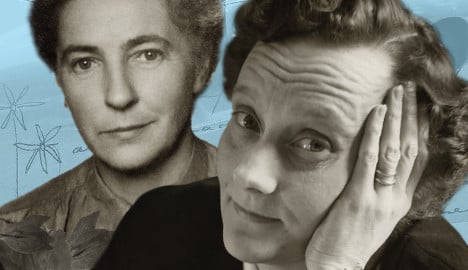The new book, titled “Jag har också levat!” or “I have also lived!” contains letters spanning more than eleven years, starting after the celebrated Swedish children's author met Hartung at a book fair in 1953, and ending shortly before Hartung’s death in 1965.
Hartung, a passionate and enthusiastic literary intellectual, had been part of the bohemian circle around Bertolt Brecht and Kurt Weil before the war, taking a role in their musical the Threepenny Opera. After the war she worked with traumatised children in East Berlin.
According to Andersen, who edited the letters, their first meeting was close to love at first sight.
“For Louise the meeting with Astrid was filled with a sense of deep connection, that can only be understood in one way — as love,” he told Dagens Nyheter. “They often return to the first night in Berlin, where Astrid also experienced an almost telepathic connection. But pretty quickly Astrid made it clear that she she could not return Louise's strong feelings.”
In some of her early letters Hartung sent flowers to Lindgren and wrote, “I want to caress and kiss your wonderfully beautiful body.”
Andersen said that out of respect to Hartung, whose passionate craving for a sexual relationship with Lindgren never appears to have been satisfied, some letters had been omitted.
“There are parts of the letters were Louise Hartung is completely besides herself, confused by what she cannot have,” he told Swedish broadcaster SVT. “That’s where we’ve felt, ‘here Louise is too vulnerable’, and chosen not to include it.”
The passionate relationship between the two was covered in Andersen’s 2014 biography of Lindgren “Denna dagen ett liv”, and also in Kristina Lindström’s documentary, “A tale of Astrid Lindgren’s Life and Times”.
Andersen said that Hartung’s friendship remained extremely important to Lindgren, particularly after she accepted that it would never be a sexual one.
“During these eleven years, they read and discussed Goethe and Henry Miller, talked about pornography, the latest movies and classical music,” he said. “Louise, based in Berlin, was a window to the world. Astrid got something here that she did not get in Stockholm.”
Hartung saw Lindgren’s children’s stories as a way of repairing a Germany still traumatised by the Second World War.
“Louise Hartung had a vision that you could heal children's wounds through art and culture of high quality,” he told SVT. “She saw that the Pippi character had an almost cathartic effect on the children who simply lacked a pacifistic role model. In Pippi they had a strong role model who did not abuse her power. Astrid thought it was amazing that her literature could work that way.”
Hartung also helped and advise Lindgren on her work in the 1950s and early 1960s.
“Through all the years, Louise was an astute and constructive reader who made sure that the German translations of her books lost none of their power and artistic finesse,” Andersen said.


 Please whitelist us to continue reading.
Please whitelist us to continue reading.
Member comments